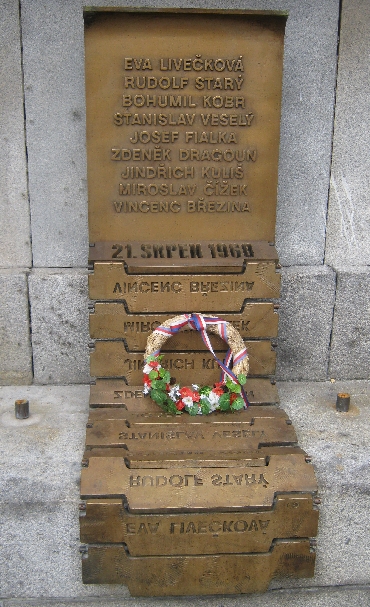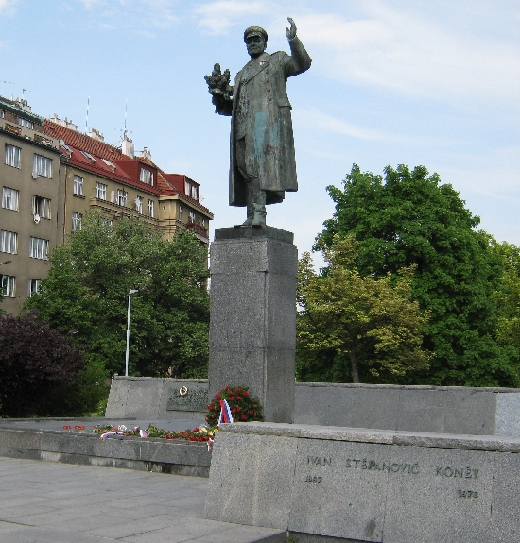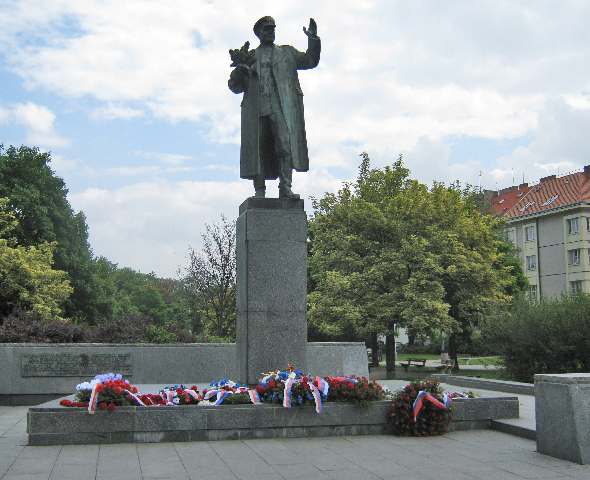
This past week saw the forty-fifth anniversary of the invasion of Czechoslovakia by the Soviet Red Army, which brought to an abrupt end, the short period of liberalisation known as the ‘Prague Spring’. On the night of 20th – 21st August 1968, around 200,000 Soviet troops poured over the borders from surrounding Warsaw Pact countries, supported by airborne troops, equipped with artillery and light tanks, who were flown in via Prague Airport. Along with the Soviet forces, there were also contingents of troops from Poland, Hungary, Bulgaria and East Germany.
Whilst Alexander Dubcek, the Czechoslovak leader who had sought to introduce, ‘socialism with a human face’, called on his people not to resist, many ignored his advice and over one hundred citizens were killed and many more injured. This memorial commemorates those who died in the city of Liberec in northern Bohemia. Many more employed passive resistance, such as painting out or completely removing road signs, so the invading troops would not know where they were. The only signs left standing, were those pointing the way back to Moscow!
The forty-fifth anniversary of the Soviet invasion has been marked this past week by a number of official events across the country. This report, from Czech Radio’s English service, tells of a commemoration held outside their own Headquarters, where several people died trying to defend those inside the building, who were broadcasting details of the invasion and calling for help from the West.
On social media such as Facebook, many Czechs have been posting black and white photographs, taken on the day of the invasion or shortly afterwards. It is interesting to note that some of those posting were not even alive at the time of the invasion!
Forty-five years on, it is also interesting to reflect upon the various consequences of the brutal implementation of what became known as the ‘Brezhnev Doctrine’ – no challenge to Soviet hegemony over all of the communist satellite states of Central and Eastern Europe.
One immediate consequence was the departure of around 300,000 people from Czechoslovakia, predominantly skilled and educated individuals that the country could ill afford to lose. In my time of living in the Czech Republic, it has been fascinating to meet several of them and hear their stories – some who have chosen to return post 1989, and others just visiting from the countries where they have now settled.
Both before and after the Soviet invasion in 1968, the one foreign language that Czech people were taught and required to learn, was Russian. Since 1989, Russian has very much become the language you don’t use within the Czech Republic. Most Czechs aged over thirty-five, who once were were able to speak Russian, seem to have since done their utmost to forget what they were taught 🙂
For as I have discovered, the people Czechs most dislike, are Russians. This is partly historical – the Russian Federation is seen as little different to the former Soviet Union who invaded in 1968 and exercised de-facto control here, until 1989. There is a strong feeling that Russia still wants to have a strong influence, but is now seeking to do so via economic means such as the supply and price of natural gas.
The other reason for a dislike of Russians is that those Russians who do live here, are seen as arrogant, wealthy, and in control of some of the less attractive aspects of life – twenty-four hour Herna (gambling) bars, prostitution, and associated people trafficking. As always, stereotypes don’t apply to everyone. There are Russians living in Prague, doing perfectly legal business and wanting only to steer well clear of Putin. But nearly all Russians living in the Czech Republic tend to get tarred with the same brush, at least part of which is the legacy of the events of forty-five years ago.




Forty-five years ago, DH and I were recently married and were house and cat-sitting for my parents-in-law while they were on holiday. I can still vividly remember sitting in their lounge glued to the TV news as the events in Czechoslovakia, as it then was, unfolded so brutally, and feeling so sad and disappointed that the Prague Spring was over. Having never forgotten these events it was lovely to visit Prague and see such a vibrant city, looking to the future and enjoying its place in the modern world.
I was only sixteen in 1968, but I too remember following these tragic events, as they were being reported via TV and Radio News. Certainly Prague and the wider Czech Republic, are now flourishing. But I do think it is most important to remember what did happen in August 1968, and not to forget those who suffered and died, seeking to defend the freedom of speech, thought and travel – freedoms we today so easily take for granted.
We’re planning to come to Prague for a week from October 7. I should say “DV” because my wife’s three previous attempts to get to Prague have been unsuccessful. The first was during a school trip to Austria… in August 1968.
So we’d be glad of prayer that this time we actually make it.
So far as I’m aware Tony, the Russians aren’t planning to invade again in early October 🙂 However, you don’t say what prevented your wife from getting here on the other two occasions! I look forward to meeting up with both of you, especially at 11.00 on Sunday 13th October.